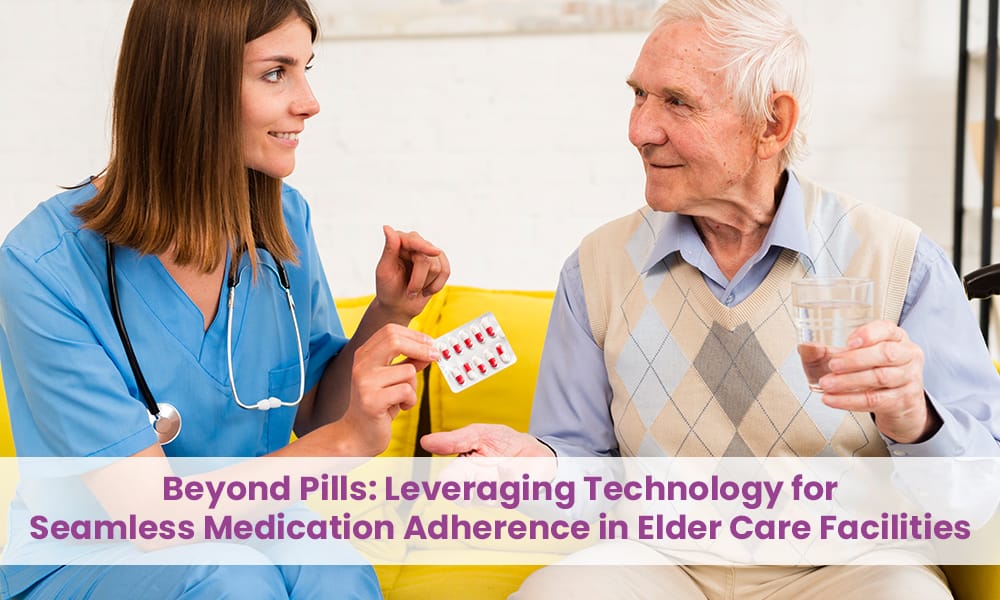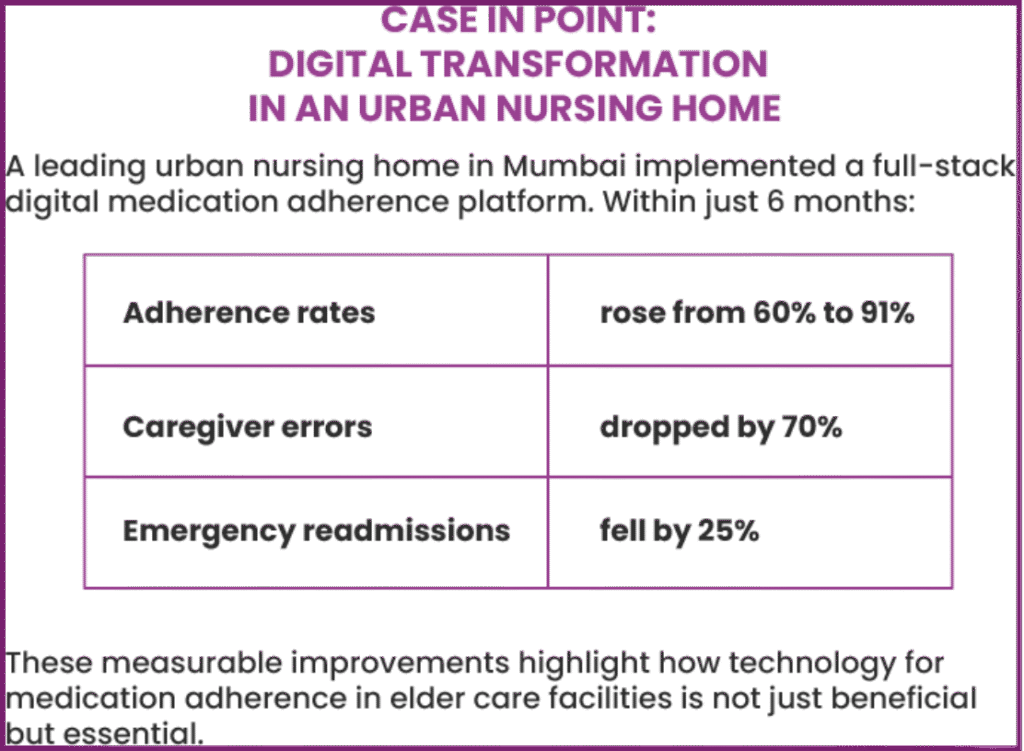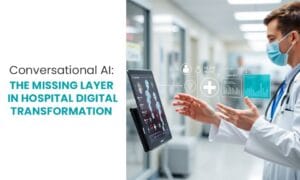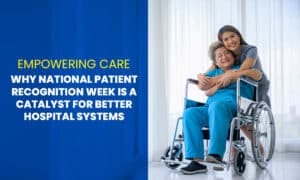
In senior care centres and nursing homes, managing medications efficiently is a growing concern. According to the World Health Organization, nearly 50% of elderly patients do not take medications as prescribed, leading to worsening health outcomes and increased hospital readmissions. Medication adherence becomes even more critical in elder care facilities, where patients often deal with multiple chronic conditions requiring complex medication regimens. Unfortunately, manual tracking methods, caregiver workload, and human errors contribute to poor adherence rates.

Why Technology is the Game-Changer
Elder care technology has the potential to revolutionise how medications are tracked, dispensed, and administered. With a focus on senior medication management, healthcare providers can now leverage automation, AI, and IoT-based solutions to enhance medical adherence across elder care facilities.
Digital innovations not only reduce human error, but also ensure regulatory compliance, improve patient outcomes, and ease the workload of caregivers. For B2B stakeholders—including hospital administrators, nursing home directors, and care coordinators—investing in the best medication management systems for nursing homes is no longer optional. It is a necessity.
Technology for Medication Adherence in Elder Care Facilities
Technologies used in adherence related to medicine, especially in various elder care facilities, are built upon principles of precision, efficiency, and safety. The implementation of automated platforms and intelligent systems is reshaping the way senior care providers handle prescriptions and monitor adherence. These technological advancements are designed to reduce the reliance on manual processes, eliminate medication errors, and ensure elderly patients receive the right dosage at the right time.
Automation tools integrate seamlessly with facility workflows, enabling streamlined medication administration schedules and reducing the burden on nursing staff. These systems come equipped with features like real-time alerts, AI-powered data insights, and cloud-based dashboards that allow both caregivers and physicians to oversee and ensure medication compliance with minimal manual effort.
• Real-Time Alerts: Smart systems are configured to send immediate notifications if a scheduled dose is missed. This allows healthcare providers to intervene promptly, preventing negative health outcomes due to skipped or delayed medication.
• Data Analytics: These platforms collect and analyse trends in patient behaviour related to medication intake. By identifying patterns of non-adherence, care teams can adjust medication plans proactively, improving both safety and effectiveness of treatment.
• Mobile Integration: Caregivers can manage medication schedules, receive alerts, and access complete patient medication histories directly through mobile applications. This enhances the accessibility and responsiveness of care services.
In addition to supporting operational efficiency, these systems help build a culture of accountability within elder care facilities. Every action—from dispensing to administration—is logged and monitored, enabling full traceability and compliance with healthcare regulations.
According to a 2024 study, elder care facilities that integrated medication tracking and monitoring apps reported a 35% increase in adherence rates within a 12-month period. This improvement not only highlights the impact of technology on patient care but also underlines its potential as a cost-effective, scalable solution for senior living centres.
How Technology Improves Medication Adherence in Nursing Homes?
Nursing homes often struggle with overburdened staff and high patient-to-nurse ratios. Adherence related to medication solutions for senior living centres automate repetitive tasks, thereby freeing up caregiver time for direct patient care. These solutions are designed not only to reduce the administrative burden on staff but also to improve the accuracy and timeliness of medication administration across all shifts.
• Automated Schedules: Medications are scheduled digitally through centralised platforms that sync across caregivers and shifts. This removes the guesswork associated with manual logs and handwritten charts. By eliminating ambiguity in timing and dosage, these systems ensure that each patient receives the correct medication at the precise time prescribed. This is especially important for elderly patients with multiple medications and strict schedules.
• Multi-Dose Packaging: Smart pill packets are prepared using automated dispensing machines that label doses clearly by time and date. Each package can include all required medications for a specific time slot, minimising confusion and simplifying administration for caregivers. This solution reduces the risk of skipped doses and drug interactions and increases the consistency of adherence, particularly in memory care units and dementia wards.
• Centralised Dashboards: Administrators and supervisors gain access to a unified digital dashboard that displays medication-based adherence data across the entire facility. These dashboards allow real-time monitoring of dose completions, missed medications, and staff performance. They also support analytics-driven decision-making by identifying patterns of non-compliance or bottlenecks in workflows. Centralised visibility makes it easier to enforce accountability and ensures that no patient is overlooked.
Hospitals and nursing homes using such platforms have reported a 60% drop in medication errors within the first six months of implementation. This directly correlates with improved health outcomes, fewer emergency interventions, and a higher standard of patient care.

Automated Medication Dispensing Systems
Automated dispensing systems are one of the most impactful innovations in elder care. These systems are designed to deliver the right dosage at the right time without human intervention.
- Touchless Dispensing: Reduces contamination risk
- Lock-and-Load Design: Prevents unauthorised access
- Voice Prompts: Assists visually impaired patients
Facilities that integrated automated systems like Hero or MedMinder saw a 40% increase in adherence and a 50% reduction in staff workload, based on a 2023 survey by HealthTech Insights.
Remote Medication Monitoring Solutions for Elderly Patients
Remote monitoring is crucial for homebound seniors and smaller elder care homes. These solutions allow caregivers and family members to monitor medication intake in real-time.
- IoT-Connected Pill Boxes: Sync with caregiver dashboards
- Smartphone Alerts: Trigger notifications for missed doses
- Cloud Integration: Stores data for long-term adherence tracking
Such tools are critical components of any modern elderly medication reminder system, enabling proactive intervention before health deteriorates.
Integrating Health Tech for Medication Adherence in Senior Living Communities
Successful integration of health tech into elder care requires strategic planning and staff training. B2B stakeholders must ensure the following:
- System Compatibility: Ensure tech tools integrate with existing EMRs
- Staff Training: Onboard caregivers to use apps and dashboards
- Data Security: Comply with HIPAA and other privacy regulations
Integrated solutions create a seamless ecosystem that strengthens medication-based adherence across facilities, aligning with modern expectations of care and accountability.
Business Benefits for Elder Care Facilities
For nursing home administrators, the business case for investing in medical adherence solutions for senior living centres is strong and multifaceted:
• Improved Health Outcomes: When facilities implement elder care technology to ensure consistent medical adherence, patient outcomes improve significantly. Elderly patients are more likely to recover faster, maintain stable health conditions, and avoid unnecessary hospital visits. With accurate dosage and timing, the risk of complications from missed or incorrect medication drastically decreases. These improved health results lead to better patient reviews, increased satisfaction, and stronger trust among family members.
• Operational Efficiency: By leveraging technology to automate medication schedules, dispense systems, and reporting, nursing homes can reduce dependence on manual processes. Caregivers spend less time on routine tasks and more on delivering personalised care. The use of centralised platforms also minimises communication errors across shifts and departments. As a result, staff productivity increases, overtime costs decrease, and workflow becomes more streamlined.
• Regulatory Compliance: Healthcare regulators require strict adherence to medication administration protocols. Digital tools provide full traceability, automatic logs, and audit-ready documentation that make inspections more manageable and less error-prone. By reducing the likelihood of compliance violations, elder care facilities can avoid costly penalties, maintain their licences, and build a reputation for reliability and responsibility.
• Brand Reputation: Facilities that incorporate technology for elder care and demonstrate high standards of senior medication management are seen as forward-thinking and patient-focused. This reputation gives them a competitive edge in a crowded market, helping them attract more residents, build partnerships with hospitals, and secure funding from healthcare networks. Families seeking care for their elderly loved ones are more likely to choose facilities that show commitment to safety, innovation, and proactive healthcare practices.
Impact Of Elder Care Technology Based On Major Metrics
| Metric | Impact of Elder Care Technology | Implication for Facilities |
| Patient Recovery Speed | 15% faster recovery cycles | Better health outcomes and reduced hospital stay duration |
| Patient Intake Rate | 20% increase in patient intake | Higher occupancy rates and enhanced service demand |
| Strategic Outcome | Improved trust, satisfaction, and long-term success | Stronger brand, operational efficiency, and business growth |
The table summarises key insights from the 2024 Digital Health Watch report on the impact of elder care technology. It highlights that elder care facilities adopting digital health tools saw a 15% improvement in patient recovery speed and a 20% rise in patient intake. These improvements are attributed to enhanced medication-based adherence, caregiver efficiency, and increased trust among patients and families. The data reinforces how strategic tech adoption in elder care drives better outcomes and operational growth.

Embracing Elder Care Technology is the Future of Medication Adherence
As the ageing population continues to grow, elder care facilities must adopt smart, scalable solutions to ensure medication safety. From automated pill dispensers to cloud-based monitoring systems, the tools are already available. The key lies in embracing them effectively. Facilities that prioritise innovation in senior medication management will not only reduce risks but also enhance their reputation and long-term success in the healthcare ecosystem.





